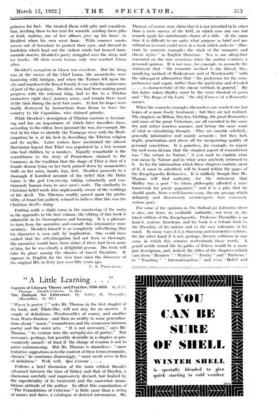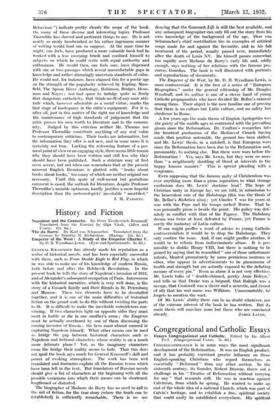" A Little Learning . . . )3
Aspects of Literary Theory and Practice, 1550-1870. 11% Thomas. (Heath Cranton. 7s. 6d.)
The Outlook for Literature. By Ashley H. TImindike. (Macmillan. 8s. &l.) " WHAT is poetry 9 " asks Mr. Thomas in the first chapter of his book, and,' Pilate-like; will not stay for an answer. A couple of definitions—Wordsworth's of course, and another from Watts-Dunton—and then on swiftly to some generaliza- tions about'' music," romanticism and the connexion between poetry and the sister arts. " It is not necessary," says Mr. Thomas, " to venture into the metaphysics of poetry." Not necessary, perhaps, but possibly desirable in a chapter so pro- vocatively named—at least if the charge of evasion is not to prove embarrassing. But Mr. Thomas is shameless : " mere tentative suggestions as to the content of these terms (romantic, classic)," he continues disar ' gly, " must needs serve in lieu of definition." Well, well. Qui s'excuse . . . .
Follows -•at brief discussion of the main critical theories Udvaneed- between. the time of Sidney and that of Dryden, it discussion carefully and impressively devised; but limited by the superficiality- of its treatment and the somewhat Imam; bitious attitude of the author. In effect this examination of • "The Foundations of Criticism " is` little more than a String of •naines and dates, a .eatalogue of derived inforination: -Me; Thomas, of mum., may claim that it is not intended to be other than a mere survey of the field, in which case one can but remark again his unfortunate choice of a title. At the same time it is difficult to see (Mite what purpose so brief and un- critical an account. could serve in a book which seeks to " illus- trate by concrete examples the clash of the romantic and claSsie styles" in English literature. Nor is one altogether reassured on the rare occasions when the author ventures a personal opinion. It is not easy, for example, to reconcile the statement Bud "the romantic method is the liberal, free: ramifying method of Shakespeare and of Wordsworth with the subsequent affirmation that " the preference for the com- prehensive and vague, rather than the particular and detailed . . . . is characteristic of the classic method, in general." By this latter token Shelley must be the most classical of poets and -"Hie Rape of the Lock '' the chef d'oeucre of a Romantik. master.
When the concrete examples themselves are read,cd one hag hopes of a more lively treatment ; but they are not realized. The chapters on Milton, Dryden, Fielding, the great Romantics and some of the great Victorians, arc all executed in the same dry and rather toneless manner, and betray the same want of vital or stimulating thought. They are careful, scholarly, generally informative and mainly accurate ; but they lack depth, penetration, and above all the invigorating quality of personal conviction. It is pointless, .for example, to repeat the well-worn diction that the simplest aspect of mmantieisnt was " the return to Nature," if you omit to explain what you mean by Nature and in what sense anybody returned to it. As for the information which these chapters contain, most of it, it must be admitted, will be found within the pages of the Encyclopaedia Brilanniea. It is unlikely though that Mr. Thomas will find authority for the statement that Shelley was a poet " to whom philosophy afforded a mere framework for poetic pageantry," and it is a pity that he should quote, from a well-known essay, the one passage which definitely and disastrously m isintiqwet s that est remely serious poet.
For sonic of.the opinions in The Outlook far' Likralacc there is also, one fears, no verifiable authority. not even in the latest edition of the Et/eye/opt:MM. Professor Thorndike is an honest, zealous American, and his book is a tribute both to the liberality of his nature and to the easy tolerance of his mind. In mat* ways it is a elms g and instructive volume. On the other hand it is not, perhaps, literary criticism in any sense in which this country understands those wonls. A genial amble round the by-paths of letters would be a more just description, and, indeed, the titles of the chapters (which vary front " Headers " " Writers " Poet ry and " Patterns," to Teaenh... lutentatiomli.m " and even "Relief and Behaviour ") indicate pretty clearly the scope of the book. On many of these diverse and interesting topics Professor Thorndike has shrewd and pertinent things to say. He is not nearly so easily hoodwinked as his rather ingenuous manner of writing would lend one to suppose. At the same time he Might. one feels, have produced a more valuable book had he worked with a less sweeping brush and confined himself to subjects on which he could write with equal authority and enthusiasm. He would then, one feels sure, have dispensed with one or two passages which reveal uncomfortable gaps its knowledge and rather alarmingly uncertain standards of value. lie would not, for instance, have claimed this for a poetic age on the strength of the popularity achieved by Kipling, Mase- field, The Spoon River Anthology, Robinson, Bridges, nous-. man and Noyes ; nor had space to indulge quite so freely that dangerous catholicity, that think-no-ill-of-any-man atti- tude which, however admirable as a social virtue, marks the first stage of inadequacy in the critic's equipment. For it is, after all, just in this matter of the right use of knowledge and the maintenance of high standards of judgement that the critic proves his own worth to literature and to the commu- nits-. Judged by this criterion neither Mr. Thomas nor Professor Thorndike contribute anything of any real value to contemporary criticism. Their books are informative, but the information they offer is not new, and in some cases it is certainly not true. Lacking the redeeming feature of a per- sonal point of view or an engaging style, there seems little reason why they should have been written and still less why they should have been published. Such a stricture may at first seem severe, but not when one remembers that at the present moment English literature is glutted with " books about books about books," too many of which are neither original nor necessary. Until this spate of well-meant but gratuitous comment is eased, the outlook for literature, despite Professor Thorndike's amiable optimism, hardly justifies a more hopeful description than the meteorologists' inevitable " unsettled."
T. M. PARSONS.



















































 Previous page
Previous page